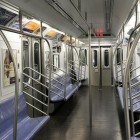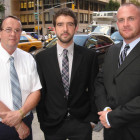Bronx
Making Their Way
Curtis Stephen |
For Tasnim Huque, the past few months have been full of surprises. Her Muslim parents, who immigrated to New York City from India’s sprawling eastern city of Calcutta in the late 1980s, are gradually allowing the 18-year-old to show some independence. While there’s little inhibiting most seniors at Hunter Science High School in Manhattan from attending the prom— except, perhaps, the cost of limos, gowns and tuxes— Huque was certain that she’d be missing it for a different reason: her 6 p.m. curfew. But her parents recently told her that she could, in fact, attend.“They even bought me a nice Westernized dress,” she says excitedly. And that’s not all she’s excited about.






